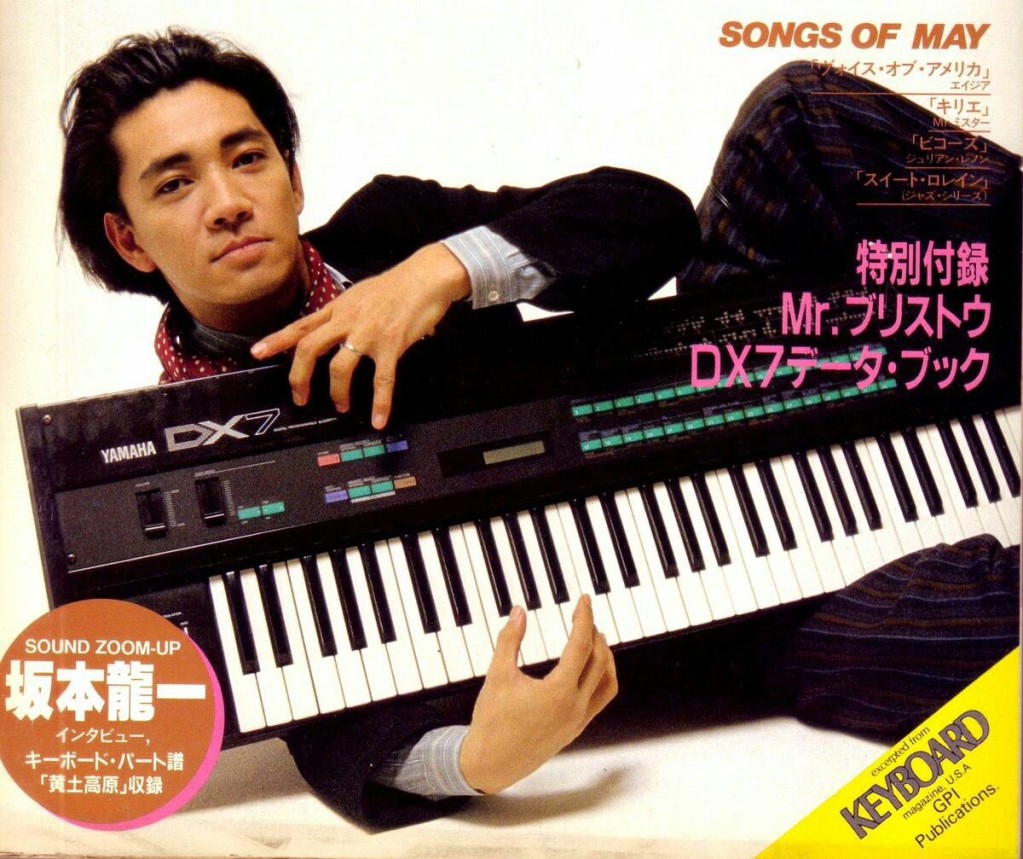From music to technology, fashion to performance, few artists can reveal a future to so many people as Ryuichi Sakamoto did in his work. The world he touched learned of his death today.
David Abravanel had already begun work on works to revisit. And David brings us a snapshot in time when the composer worked with an influential new approach to sampling, via a new machine.
I think even amidst all these photos today, my favorite is this one at top. The text it seems comes from our US Keyboard Magazine. (I recall for a time the magazine was translated into Japanese.) Thanks to Sharooz Raoofi for this.

The official statement from commmons:
Here’s the English text:
An Announcement
We are deeply saddened to announce the passing of artist and musician, Ryuichi Sakamoto, on the 28th of March, 2023. He was 71 years old.
While undergoing treatment for cancer discovered in June 2020, Sakamoto continued to create works in his home studio whenever his health would allow.
He lived with music until the very end.
We would like to express our deepest gratitude to his fans and all those who have supported his activities, as well as the medical professionals in Japan and the U.S. who did everything in their power to cure him.
In accordance with Sakamoto’s strong wishes, the funeral service was held among his close family members. Please understand that we are unable to accept any calls of condolences, offerings of incense or flowers, and the like.
Finally, we would like to share one of Sakamoto’s favorite quotes:
“Ars longa, vita brevis.”
Art is long, life is short.
While many will share in this loss, we ask that you respect the family’s privacy during their time of grief.
April 2nd, 2023
Kab inc.
Avex entertainment inc.
commmons
Ryuichi Sakamoto, 1952 – 2023
Ryuichi Sakamoto was the rare musician who could consistently look into the future, past, and present with his music – whether it was glitch sound art and pioneering sampling, delicate versions of Bach and Debussy, or his many film soundtracks.
Underrated music to revisit
Focusing on some of the underrated/overlooked albums in Sakamoto’s substantial oeuvre, I recommend anyone to checking out the following:
Willits + Sakamoto – Ocean Fire (2008)
One of Sakamoto’s two collaborate albums with kindred spirit Christopher Willits, beautiful ambient textures of processed guitar and piano.
Love Is the Devil (1998)
Soundtrack to the brilliant film of same name about Francis Bacon. Dissonant piano pieces and oddly-comforting electronic shuffles fit this darkly comic and disturbing look at Bacon’s distinct work and his relationships with friends and lovers.
Chasm (2004)
Not so much overlooked as it was promoted heavily upon its release, but amidst much of his work, it’s good to remember how playful Sakamoto could be. Here he embraces hip-hop and electronic styles in novel ways, even while covering some of his favorite serious topics (war, environmentalism).
Logic Murata Drum
While working on their fifth album, 1981’s Technodelic, Yellow Magic Orchestra procured a prototype of the LMD-649, a pioneering sampler. Built by Toshiba-EMI designer Kenji Murata, the “Logic Murata Drum” played the same core technological role on Technodelic as the TR-808 had played on the preceding album, BGM.
Featuring 12-bit sampling (a step up from the 8-bit sampling capabilities of the Fairlight CMI, which had been released in 1979 but with which Murata was apparently unfamiliar while developing the LMD-649), the machine – alongside the influence of industrial music – facilitated YMO’s turn from ironic camp and disco/pop influence towards a sound that was at points harder and more contemplative. “Seoul Music” and its cutting syllabic percussion, “Epilogue” and its factory recordings from collaborator Yoshifumi Iio, and the short fricatives that loop throughout the tenderly gorgeous “Light in Darkness”, exemplify YMO’s use of this pioneering technology.
It’s worth noting that Technodelic was far enough ahead of its time to be YMO’s worst-selling album (originally there was not even an American release), yet it stands as perhaps their most influential work from a technological standpoint – and is a classic that is well worth seeking out.
More:
YMO – “Seoul Music”
Ryuichi Sakamoto – “Bathroom” from Love is the Devil
Willits + Sakamoto – “Toward Water”
Sakamoto liver performance of “War and Peace” from Chasm
And for the influence of this approach to sampling, see
Depeche Mode – “Everything Counts” / Boards of Canada – “Telephasic Workshop“
Remembrances
And this year we got still new music: